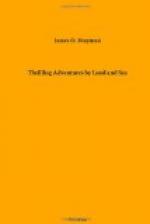After some discussion, the robbers consented to allow them to pass, on the payment of fifty piastres, (two dollars and a half,) which they agreed to do, provided they were conducted to the house of the Agha. The robbers objected to this, and, provoked by the delay, leveled their guns at the party. At this juncture, the chief muleteer advanced the necessary money, and they were spared.
“These transactions, from the time we were stopped, occupied about an hour. We now passed with our ragged regiment straggling around us, now with their long guns under our ears, and now cutting off the long bends of our crooked and little used path. In about ten minutes from the pass, we were hailed by another party, posted upon a hillside, and a discussion of many minutes ensued between them and our escort, in which our Kurdish muleteers took an active part. The result was, that we moved on with an addition of two men to our guard. We soon began to perceive that we were going toward the Agha rather as prisoners than as guests. The castle, (if it may be dignified by the name,) which was now in sight, was of no promising appearance. It was a rude, rectangular building, with a small white tower at one corner, on which the workmen were still engaged. It was situated on the side of a hill which formed the head of a valley opening into the ravine we had just left. The small windows and the roof were crowded with men, women, and children, gazing at our singular cavalcade. As we drew near, some women who were bathing in a brook, rose, and gazed at us with irrepressible curiosity. We stopped at the door of the castle.
“Here the assault began. The men of our guard flew like savage dogs at our servants: Khudhr and Ablahad seized the arms which were girded about them, slashing furiously with their daggers, to cut the straps of their guns and pistols. The turbans were torn from their heads, and appropriated among the rabble. Similar violence was about to be shown us, when these operations were suddenly interrupted by the appearance, from the castle, of Melul Agha.
“He was a man taller by several inches than any of his tribe, and with an expression of face which was that of one accustomed to be obeyed, He was dressed in a more elegant style than could have been expected in these mountains; wearing upon his head a turban of gray silk, and a long rifle slung from his shoulders. With a melo-dramatic wave of his hand, which was at once obeyed, he motioned his noisy tribe to desist, and, approaching us, pointed out a tree, a few hundred feet up the hill, to which we might retire. As we moved alone toward this spot, a grim suspicion of his intentions crossed our minds. Might it not be for convenience in dispatching us, that we had been removed? We seated ourselves quietly in the shade, and watched the proceedings. The property of the muleteers and donkey-drivers had been unloaded and placed by itself. One of our loads had been thrown from the mule, and the other was now brought near us, taken from the animal, and laid under a neighboring tree. Mr. Marsh now went down toward the castle to assist Khudhr in bringing the rest of our property toward the tree. This done, Khudhr returned to the crowd to learn what he could of their intentions. He soon came back to us in evident terror, and said, with a significant motion of his hand, that they were intending to kill us.”




